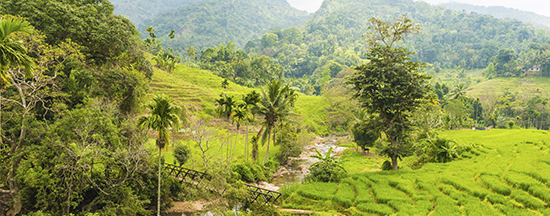Making a splash for SDGs and climate goals
Event Coverage article : A river runs through it: Why water needs a landscape approach too
Understanding the role of forests and deforestation on local, regional and global precipitations (VIDEO)
The landscape approach: ten principles to apply at the nexus of agriculture, conservation and other competing land-uses
Forests and water; what policy makers should know
FAO Forests and Water Action Plan
Background to the 2015 World Water Week
Forests and water: a policy perspective
A main driver of rural landscape change is the rapid agricultural expansion and intensification required to satisfy increased food and other demands. In the quest to reach effective land management for the optimised use of natural resources, landscape approaches are becoming widely implemented – often related to the integration of agriculture and forestry. The landscape approach is used to analyze growing pressures on natural resources and how these can best be met in a sustainable manner.
This Discussion Forum provided a platform for debating how the landscape approach can contribute to the sustainable management of land and water resources. We build directly on the recommendations of the World Water Week seminar on the same subject. Thus far, sustainable water management and securing safe water for people living in or downstream the landscape is not at the fore of the landscape approach dialogue.
The full integration of the benefits of water and forested landscapes in the Sustainable Development Goals (SDGs) is both desirable and feasible. Aspirations for trees, forests and water can be both universal and differentiated to local circumstance. This Discussion Forum presented concrete options for the inclusion of forests and water within the post-2015 sustainable development framework.
Key speakers shared examples on how land use affects water and other resources. The main question the panelists addressed was: Is there scope for an integrated landscape approach to contribute to optimised watershed and river basin management that can be effective in realizing the SDGs?
The event was very popular and discussion in the overcrowded room was intense. The main message was that the importance of the linkages between forests and water need to be better acknowledged and more integrated solutions to land use must be sought. ed further research.
More highlights from the Forum can be found here.
Read more
Venue name: Global Landscapes Forum
Venue address: Le Palais des Congès de Paris, 2 place de la Porte Maillot 75017 Paris|
Venue URL
Programme
This is a draft programme
Intro
Key note speaker
Elisabeth Backteman, State Secretary, Swedish Ministry for Rural Affairs
Panel
- Deborah Bossio, Director of Soil Research, International Center for Tropical Agriculture (CIAT)
- Peter Holmgren, Director General, Center for International Forestry Research (CIFOR)
- Torgny Holmgren, Executive Director, Stockholm International Water Institute (SIWI)
- Anders Malmer, Director, Swedish University of Agricultural Sciences (SLU) program SLU Global
- Tui Shortland, Managing Director, Repo Consultancy
Moderators
Lotta Samuelson, Stockholm International Water Institute (SIWI)
Terry Sunderland, Center for International Forestry Research (CIFOR)
Method for knowledge sharing and facilitating an interactive exchange with the audience
- Panelists will be limited to a 5-10 minute presentation each, to ensure adequate time for Q&A from the audience. The facilitator will give a brief intro of each panelist and bios will be provided in a handout to the audience so that the panelists focus on the content of their presentation and to save time.
- There will be at least 45 minutes for interactive Q&A with the audience.
- To build energy and foster learning, the facilitator will encourage panelists to ask each other questions, and will also query panelists and the audience when either contradictions or inconsistencies or gaps in logic appear to prevail.
- We will stimulate different perspectives on issues and problem-solving. We also will respect differences, while taking positions as appear justified from the feedback from the panel discussion.
- There will be selective use of visuals that enhance the audience’s learning and participation. For example, we will provide handouts that are informative and can stimulate audience questions.
Key Questions for panel:
- How do we manage land and water resources holistically and sustainably to secure ecosystem services and meet the multiple needs from different users of the Landscape?
- What have been the challenges of implementing landscape approaches regarding water resource management?
- What conditions at policy and capacity levels need to be in place for a landscapes approach to be successful in the context of sustainable water management?


